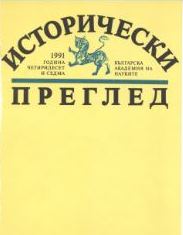За нравствените възгледи на Неофит Рилски
About the Moral Concepts of Neophit Rilski
Author(s): Rumyana RadkovaSubject(s): History, History of ideas, Modern Age, 19th Century
Published by: Институт за исторически изследвания - Българска академия на науките
Summary/Abstract: The bourgeois relations which emerge in the period of the Bulgarian Renaissance release from the narrow mediaeval dimensions of life relatively huge masses of people and place them in the scene of the rich and versatile social, political and cultural creation. The important of the person increases, there is need of more active ones, who consciously to take their share in the development of society. In the changing economic conditions the Bulgarian must become independently thinking, enterprising, knowing, ready to venture and especially acknowledging not only the relation with the family and the community but also with his people and fatherland. All this strenghtens the role of the moral factor in the life of the Bulgarian society. The moral categories conscience, duty, honour, and selflessness for the national cause are met often in the theories of the Bulgarian social figures. Gradually the morality of the new time is formed. The analysis of the concepts and the practical activity of Neophit Rilksi clearly shows the struggle of criteria and ideas of new and old type, which is Characteristic for the formation of the concepts of morality of the new time in the Bulgarian society. There is absence of opposition to the ethic norms of the orthodox ethics. Neophit takes many of the postulates, means and forms of moral, suggestions and qualities from this social scale. He tries to conciliate some of the positions with the value criteria, growing under the objective conditions and ideas of the educational ideology. The moral concepts and consciousness of Neophit Rilski are manifestated mainly in concrete actions, but the creation of a definite ethic theory is not postponed. His practical activity clearly shows how in the cracks of the traditional concept of morality, subordinate to individualism, a new idea about the aim of human life is created, and the duty to the god is transformed into a duty to the people and the admiration in front of the belief and accompanying deeds are replaced with deeds of civil character and national inclination.
Journal: Исторически преглед
- Issue Year: 1991
- Issue No: 8
- Page Range: 81-99
- Page Count: 19
- Language: Bulgarian
- Content File-PDF

